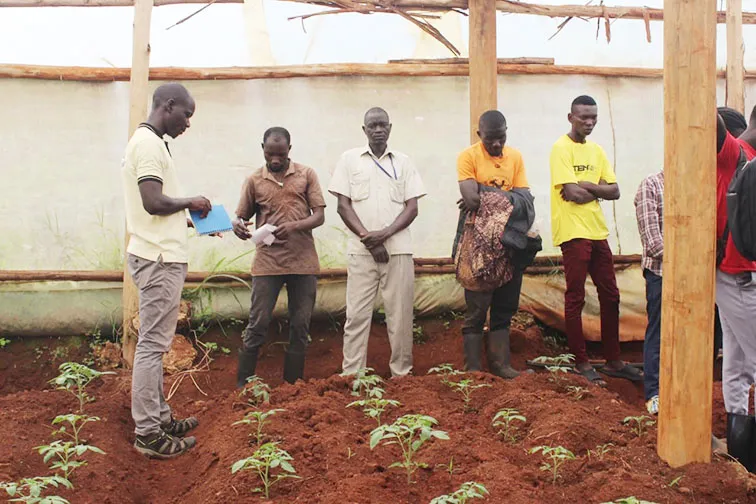By Pauline Luba
Farmers in Katente Village, Nakisunga sub-county in Mukono district, have long benefited from the classroom knowledge of students at Uganda Christian University’s (UCU) Faculty of Agricultural Sciences. Likewise, from these workers among crops and livestock, students have gained an understanding of how their curriculum is applied outside of lectures and textbooks.
This exchange of ideas, experience, and knowledge is part of an outreach program designed specifically for third-year students pursuing a Bachelor of Agricultural Science and Entrepreneurship.

“We extended the outreach to different villages across Uganda, and all of them were identified through the church,” Ms. Sheila Namuwaya, the head of the Department of Agriculture, said.
She further explained what the outreach entails. “The students are assigned households, after which they identify what the farmers have and their respective needs.” They then plan how to help the farmer achieve more value for money.
Ms. Namuwaya has been in charge of these programs since she joined UCU 11 years ago. Among the recommendations that students often make to the farmers is setting up a vegetable garden so that the farmer’s family is able to partake of the benefits that come with eating vegetables. Also, it is intended that the surplus vegetables can be sold to the community. Another recommendation involves rearing livestock.
“I believe this program is important because it helps students realize they can do things in a practical sense,” Ms. Namuwaya said.
Once the selected households have agreed to the project, students are then

transported from UCU to Katente, a distance of about 10 miles from the UCU main campus. The students spend time with the farmers they have been attached to once a week, from 8a.m to 1p.m, for the duration of the outreach.
The safety of the students is ensured because the local council leaders and the police are key figures in the project. The farmers are not provided with funds, nor are the students given any financial compensation by the farmer for the work done for them except that a farmer may give something from their farms as a gesture of courtesy.
Funding for student transportation has been a barrier overcome by combining the off-campus experience with farmers coming to the Mukono campus.

Of the on-campus outreach, Ms. Namuwaya said, “We got a number of farmers from around the university community in Bugujju to come, interact, and learn with the students.”
This year, the farmers and the students participated in outreach activities in the gardens set up at the university demonstration plot. Students choose their desired enterprises to work with. However, the number of students participating in the outreach exercise has been dwarfed by the enthusiasm from the farmers in Bugujju. For instance, during one of the in-campus sessions, there were 30 farmers for the nine students. The department hopes to undertake measures that will see an increase in the number of students pursuing the course.
“We are carrying out aggressive marketing of the course so that the student numbers can increase,” Ms. Namuwaya said.
She hopes more students can realize the benefit they accrue from the outreach activities conducted so they put into practice the knowledge gained in the classroom.


